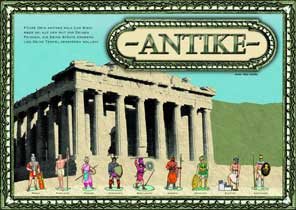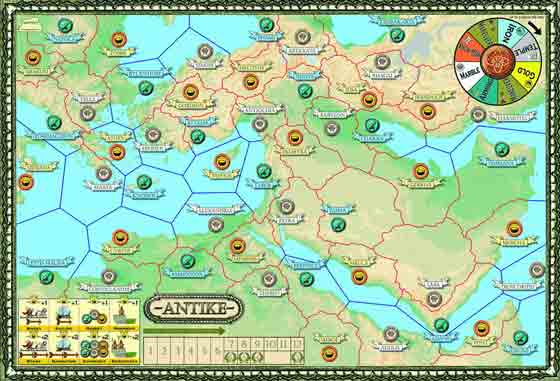
After discovering Peter Eggert’s excellent Neuland (reviewed in Flagship 113), I was keen to see the new games from Eggertspiele at Spiel ’05 – and particularly the company’s new strategy game, Antike (Antiquity). My enthusiasm was tempered by the knowledge that it was not designed by Peter Eggert himself. I needn’t have worried. Designer Mac Gerdts has come up with an excellent game. The double-sided board shows the eastern Mediterranean and Near East on one side and the whole of the Mediterranean on the other. Rather neatly, one side is in German, the other in English. The same double-sided, bilingual approach is taken to the rest of the game’s components. This makes the game immediately accessible to both German- and English-speaking players. And the ‘other side’ of the game can be used quite easily once they know how the game works. Other publishers who want to address both markets, take note! The territory shown on the board immediately provokes comparisons with Civilization. This similarity is pretty superficial and quickly disappears when you get into the detail of the game. In Antike the aim is to be the first player to reach a target number of victory points. There are five different sets of cards, representing major figures of antiquity: Plato, Alexander, you get the idea. Each card is a victory point and the cards in each set are gained for achieving different things on the board. The easiest cards to obtain – to start with, anyway – are gained for each five cities the player has on the board. This in itself has several layers. First you have to move a legion or fleet into an empty province. Then you can build a city, which costs one of each commodity in the game: iron, marble and gold. So you have to have produced the commodities first. Each province produces one commodity, so players will always expand their empires at the start of the game to gain more commodities. The victory points are almost incidental. Each of the commodities can also be used to build other things: Iron to create new legions and fleets; Marble to build temples; and Gold to advance knowledge. Temples are placed in a province and are very useful. To start with, they triple the production of the province. Second, they allow more legions or fleets to be built there. And they triple the defence strength of the city – very useful in the later stages of the game as players expand into each other’s territory. Temples also bring victory points: every three Temples is another point. Knowledge is even more useful. There are four fields of knowledge with two layers in each. Being the first to acquire knowledge costs a substantial chunk of gold, but brings the player a victory point card (the third set). It also gives them some advantage. For example: the first level of transport allows the player to move legions two spaces; the first level of navigation allows fleets to move two. Once somebody has made this ‘discovery’, it’s then cheaper for other players to acquire it. So the first player may not keep the advantage for long. But they have a victory point, which subsequent purchasers don’t get. There’s also a ‘super-power’: getting to the second level in all four fields of knowledge allows a player to use each commodity interchangeably. That is, gold can be used to buy knowledge, create troops or build temples, for example. Anyone who achieves this probably has the game in the bag. 
Players can’t ignore the situation on the board. They will run out of neutral territory to conquer all too soon. Those who want to continue expanding will then have to fight. The combat rules are very simple: the larger force wins. However, battles are treated as part of movement. Legions and fleets need a ‘movement point’ to attack. Since the standard is one move, players can move a force on one turn, but have to wait for the second before they can attack. And who knows what will have happened in the meantime. This is why movement knowledge is important: it lets you attack faster! The final point about combat is that the winner sacks any temple when taking over a city. And each temple sacked is worth a victory point (it’s not all about how civilised you are!). This leaves one set of victory points unaccounted for. Because, strangely, it seems to be the most difficult to achieve. Players can gain a point for each seven sea areas they have a fleet in. This is tricky because there aren’t that many sea areas. However, unlike land, you don’t have to control the area for it to count. Though other players tend to object to having enemy fleets sitting outside their cities. I haven’t yet described what happens in a turn and this is where the game is really clever. At the hearty of Antike is a circular track of eight spaces, around which each player moves a pawn. At the start of a turn, the player can move three spaces for free or pay to move further. Then they can do the action they’ve landed on. Three of the actions generate one of the three commodities. Another three actions allow players to spend each commodity. The actions of acquiring and expending a commodity are, of course, opposite each other. The remaining two actions allow the player to move their pieces on the board – and gain territory. This means it takes time to do anything. A player can’t simply build a big army and attack. They have to get the iron, then the armies and, finally, move. A minimum of three turns – more if you don’t want to pay out. The initial strategy of the game is fairly clear: grab more territory. The question is where to go from there. Concentrating on iron-producing provinces allows you to build up your armies and go conquering. But you’re unlikely to be able to win just on territory. Focus on marble and build lots of temples is another option. Again, it won’t win the game on its own and it will make you a target for your militaristic neighbours! Or go for gold and be first into each field of knowledge. Though this is likely to leave you with a smaller, weaker presence on the board. In practice some mixture of the three is needed. Using knowledge or temples to increase your production is good for the long term, but makes for a slow start. However, this kind of strategy has paid off for me in several games – though I haven’t had serious competition for knowledge. Yes, this is a game where you need to keep an eye on what your opponents are up to. Then you can throw the odd spanner in the works – something everybody needs to do to stop anyone establishing a lead. However, the key to success seems to be following a strategy that is different from everybody else. I’ve certainly established how powerful knowledge can be; the question is how players’ strategy will evolve to deal with this. I look forward to finding out. Antike is a terrific strategy board game. One of my favourites from Spiel ’05 and certainly one of my games of the year. I recommend it whole-heartedly. Antike is a strategy board game designed by Mac
Gerdts and published by Eggertspiele. It is for 2-6 players, aged
12+, and takes around 2 hours to play. It is available in specialist games shops in the UK.
| Pevans |